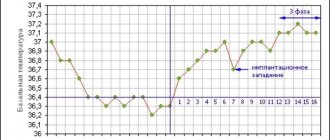How many days later should you take a pregnancy test?
To answer this question, it is important to understand how it works. Some time after conception, a woman’s body significantly increases the production of the “pregnancy hormone” - hCG (human chorionic gonadotropin). The test contains a special substance that reacts to the presence of hCG and colors the strip. Actually, everything is logical and simple: enough hCG in the urine - there will be two stripes.
HCG levels do not begin to rise immediately after intercourse. Even when the sperm meets the egg and fertilization occurs, the concentration of the hormone does not change in any way. Therefore, a pregnancy test taken the morning after sex will be negative. The increase in hCG production begins only after the fertilized egg attaches to the wall of the uterus. This happens 6–10 days after sex and conception. In the first days, the increase in hCG levels will be insignificant, then everything depends on the sensitivity of the test.
- The most common rapid tests are “tuned” to a sensitivity of 25 mIU/ml. This level of hCG is achieved only a couple of weeks after fertilization, which means that a pregnancy test can be taken 1-2 days after the delay. In the first days, you will need to wait a little while the reaction occurs and the strip turns color. Over the next few days, the concentration of hCG will skyrocket, and most tests will show a positive result almost immediately after entering the urine.
- You can ask your pharmacy for early pregnancy tests. They have a sensitivity of only 10 mIU/ml, thanks to which they are able to show results even before the delay, 3-4 days before the predicted start of the menstrual cycle.
Evitest Proof
This pregnancy test has a tablet design, thanks to which urine is evenly distributed over the substrate with the reagent (and this ensures the most accurate result). An important point is the impossibility of sample contamination, which also increases efficiency. The reagent is located in the window, so it cannot even be touched accidentally. The disadvantage of the Evitest Proof test is that it is most convenient to carry out at home. Otherwise, this is an excellent option if you need to determine as accurately as possible the presence or absence of pregnancy.
Evitest Proof
Pregnancy test EVITEST is a one-stage diagnostic hCG test - a test for quickly determining pregnancy in the early stages, based on the content of hCG hormones in a urine sample.
EVITEST helps solve such an important problem for a modern woman as early diagnosis of pregnancy. from 204
5.0 1 review
24
- Like
- Write a review
What time to take a pregnancy test?
If a woman is “deeply pregnant”, it doesn’t matter what time of day it is done - it will instantly show a positive result. However, at the very beginning of pregnancy, it is necessary to take into account daily fluctuations in hCG levels. The maximum concentration of the hormone is reached in the first half of the day, then falls. This is why a pregnancy test must be done in the morning. During the day and evening, you may get a false result due to a drop in the hCG content in the urine.
Another factor that can ruin the test is urine that is too “diluted.” You shouldn’t put too much work on your kidneys, i.e. Drink plenty of fluids or take diuretics before the test.
Frautest Planning
The package contains 5 ovulation tests, 2 pregnancy tests and 7 urine containers. This is an excellent kit for those who are planning a pregnancy and are actively working on it. Frautest Planning is one of the most accurate pregnancy tests from the Hungarian. Thanks to such a “rich” set, you can not only “catch” the day of ovulation, but also determine pregnancy. Moreover, Frautest Planning can be used as early as two days before the expected delay. The included disposable urine containers can be used not only at home, but are easy to recycle. One disadvantage of this pregnancy test is the high price. But if you calculate how much everything will cost separately, then the cost of the kit is quite justified. This test will be appreciated by those women who are planning a pregnancy.
Frautest Planning
Test strips impregnated with reagent (labeled antibodies to LH to determine ovulation, labeled antibodies to hCG to determine pregnancy).
from 327
5.0 1 review
24
- Like
- Write a review
What types of pregnancy tests are there?
They all work on the principle of determining the concentration of hCG in urine - there are no other options. As we have already said, they differ in what day the pregnancy test is taken, i.e. sensitivity. In addition, they have differences in design. Let's look at what types are available for sale.
Strip test
This is the simplest option, which is a strip of paper with a mark applied, to which it must be immersed in a container with urine. The advantages of the strip test include the fact that it is the cheapest of all, the disadvantages are the need to aim at the jar and a complex usage pattern compared to others. The strip must be immersed in urine strictly to a certain level and kept in it no less and no more than the time specified in the instructions. A small error can lead to a false result.
Test cassette
Cassettes (sometimes called “plate tests”) are strip tests in convenient packaging. When conducting such a study, a jar is not used, and nothing needs to be immersed anywhere. It comes with a pipette, from which you need to drop a couple of drops of urine into a special window and wait for the result. Despite the fact that there is a regular test strip inside the cassette, this scheme of action significantly reduces the likelihood of error.
Jet test
As the name implies, the test must be placed under a stream of urine. This is its main advantage: due to the fact that it does not require any auxiliary devices, it is very easy to use. However, you always have to pay more for convenience: the disadvantages of the method include a higher price.
Electronic test
An electronic test is the highest level of comfort in determining pregnancy. Like the jet one, it needs to be placed under a stream of urine, but you don’t have to look closely at the stripes. The test itself will write “pregnant” or “not pregnant” on the screen. Some models can even show how many weeks have passed since conception - just like a real laboratory study. This method, perhaps, has almost no disadvantages, if you do not take into account the highest cost of all.
Reason to buy a test
- Your mammary glands began to hurt and swell.
- Instead of menstruation, pink spotting appeared.
- You feel a nagging pain in your lower abdomen.
- You feel sick or vomit in the morning and throughout the day.
- You begin to get tired quickly and fall asleep as soon as you find yourself in the chair.
- The desire to go to the toilet in a small way began to arise more often than usual.
- You began to experience migraines that were unusual for you.
- You have a pigment stripe from your pubis to your navel or the skin around your nipples has darkened.
- You suddenly started eating foods that you previously couldn’t stand.
- You became nervous and whiny. And in general, your mood ceased to belong to you.
How to take a pregnancy test correctly?
You will find exact information about this in the instructions for the express test; each of them may be slightly different. When carried out correctly, they provide a very high level of reliability - almost the same as testing blood in a laboratory. In most cases, the wrong result is obtained due to trivial errors, and here are the most common ones:
- The test was done too early. Doing it immediately after conception is completely pointless. Tests with standard sensitivity work starting from the first day of the delay, more accurate ones - 3-4 days before.
- The test was carried out in the afternoon or evening. At the beginning of pregnancy, when the concentration of hCG during the day may become too low, it should be done in the morning.
- There is a lot of water in the urine. Don't drink a lot of fluids the night before the test and don't take diuretics.
- The expiration date has expired. If the test is expired, it may give a false negative result. Be sure to check the expiration date before use.
There are other factors that can cause an incorrect result, such as ectopic pregnancy, tumors and other diseases4. Therefore, remember: a pregnancy test is not the ultimate truth, but just a reason to see your doctor. Only he can finally confirm that the joyful event has happened!
Expert opinion
Mikhail Alyokhin pharmacist:
– Don’t forget that two lines on the test are just a reason to contact a gynecologist for an examination. After all, only in a clinical setting is it possible to reliably determine the presence of pregnancy and its correct development. Although a new generation of tests have already appeared in Europe, the results of which leave no doubt. These devices not only detect the presence of hCG in the urine, but also find an atom in the molecule of this hormone that appears specifically during pregnancy. But the Russian market does not yet even dream of the appearance of such tests in pharmacies. They are too expensive and are unlikely to be in demand among customers.
Reasons for false results
It happens that even the most reliable tablet reagents for determining pregnancy give false positive or false negative results. This can happen for the following reasons:
- The product was unfit for use: expired or stored incorrectly.
- When conducting diagnostics, the manufacturer's recommendations were ignored.
- During the menstrual cycle, ovulation was stimulated with medications.
- Another 10-14 days have not passed since the abortion.
- The presence of diseases, for example, renal failure or other pathologies.
- The pregnancy is ectopic.
Why did the hormonal imbalance occur?
A missed period does not always mean pregnancy. And if the test is negative, do not delay your visit to your obstetrician-gynecologist. Because menstrual irregularities are an alarming symptom that needs to be dealt with by a specialist. But first you need to understand when it's time to start worrying. Remember these numbers:
24–38 days (remember that the day the menstruation begins is considered the first day of the cycle). Less than 24 days or more than 38 is a reason for concern.
Menstruation should end in 8 days If bleeding continues longer than this period, you should immediately contact an antenatal clinic.
Now let’s talk about why women have different menstrual cycle lengths.
It is divided into 2 phases, each of them has its own indicator of female hormones. In the first half of the cycle, if it is regular, a full-fledged follicle in the ovary is supposed to mature, and then ovulation should take place. In the second gap, in place of the hatched egg, the formation of the corpus luteum will occur. It is responsible for the hormone that is needed during the 9 months of pregnancy - the hormone progesterone.
The duration of the 2nd phase is the same for all women - 14 days. But the 1st can be from 10 days to 20, and even longer, since each woman needs different time for the egg to mature. It is this period that determines the duration of the menstrual cycle.
Why is it so dangerous if menstruation occurs irregularly?
If the red days of the calendar do not come in the next month, then imbalances in the functioning of the reproductive system immediately occur, which causes serious problems for the entire woman’s body.
For example, can one with a high probability assume the likelihood of infertility and the problem of miscarriage of a future pregnancy if the patient’s corpus luteum is not functioning well, or there is insufficiency or dysfunction of the 2nd phase?
Uterine bleeding occurs, endometrial pathology appears (even cancer), if ovulation does not occur, there is no balanced change in the endometrium (uterine mucosa).
A doctor may suspect osteoporosis if follicles stop developing normally, which means that estrogens (female sex hormones) are poorly synthesized. However, receptors susceptible to them are found not only in bones, but also in hair, skin, vessel walls, brain, and mucous membranes. Therefore, all organs suffer from hormonal imbalance. This means that a woman’s solution to any health problem should begin in the gynecologist’s office. This will save effort, time and money.
Many women do not realize that weight affects menstruation.
Very obese women will have irregular cycles. Such patients complain to the doctor about the need to frequently change pads. Their periods do not come according to the calendar and last longer than expected.
Or a completely different patient - a young girl diagnosed with anorexia. She wants to look slim and has lost all her fat tissue. As a result, the body has nothing to produce estrogens from, and menstruation stops altogether. As a rule, such patients have osteoporosis, dry mucous membranes (including the genitals), it is difficult for them to study and work, since it is difficult for them to remember any information.
Over the years, the reproductive system asks for rest. She usually gets tired by age 40. And then the cycle is no longer so regular, warns gynecologist-endocrinologist Victoria Kasyan . – But in some situations, menopause occurs at 30 years old. This feature is often passed on from mother to daughter. If a woman knows about a family problem, she will rush to have a child.
Sometimes there are other reasons for menstrual irregularities.
The doctor will definitely ask the patient if she has recently experienced serious stress. Any experience interferes with hormonal balance. It is a well-known fact that during the Second World War, many women simply stopped menstruating, since nature protected their offspring in this way and postponed procreation until more favorable times. Heavy physical activity and strict diets also cause hormonal imbalance, so the doctor will ask whether the woman has become more diligent in her fitness routine or has changed her diet.
Chronic illnesses can affect the regularity of menstruation. For example, women with thyroid dysfunction experience either delays or bleeding.
There are certain groups of medications, the use of which leads to cycle disruption.
There are also congenital causes of cycle disruption. For example, such as polycystic ovary syndrome, when an excess amount of male sex hormones is produced.
However, there are many reasons for menstrual irregularities. And the gynecologist will conduct the necessary studies.
Don't be lazy to keep period diaries. Today it’s not difficult to do this - any mobile phone has a calendar. Oh, you can always fix the failure and come to the gynecologist on time.







